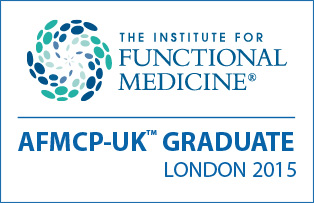What is Functional Medicine?
Functional Medicine is a way of addressing health problems. Functional Medicine practitioners are skilled at determining why a disease or symptom happens. Once this is understood, health can be restored by addressing the root cause of the disease or symptom.
For example, a headache isn’t a deficiency in paracetamol. We need to consider what might cause the headache in the first place.
- Is the person dehydrated?
- Have they had their eyes tested recently? If not could it be eye strain?
- Do they spend long hours hunched over a laptop causing muscle tension?
- Perhaps they have a hangover?
Rather than using the old way of dealing with symptoms, that is, popping a pill, we need to look for the underlying causes and address those. This approach is Functional Medicine.
You may also hear about Lifestyle Medicine which aims to prevent and reverse the diseases of today in which our chosen lifestyle contributes as an underlying cause.
Disease is complex
A given disease may have multiple underlying causes that need addressing in order to restore health. Irritable bowel syndrome can be caused by:
- food sensitivities
- lack of digestive enzymes
- nutrient deficiencies
- stress
- motility problems
- imbalances in the gut flora
In contrast, a single underlying cause may contribute to many different diseases. For example, inflammation is an underlying cause of:
- cardiovascular disease
- Alzheimer’s disease
- joint problems
- cancer
- depression
Prevention of disease

Prevention of disease
When it comes to prevention of disease, the key thing to remember is that the time to take action is now. Why gamble with our health? Commonly, we wait until we get symptoms or we are diagnosed with a disease and then we start to look for a solution. Ideally, we don’t want to wait for this to happen. Symptoms are signs from the body that all is not well and, if left alone or treated without addressing the underlying cause, may develop into disease later on in life.
The reason for taking action now is because we may not actually have any symptoms at all. Here are a few examples:
High blood pressure
There are few signs that blood pressure is high until something happens like a stroke. Testing and screening is therefore important. So, having a blood pressure check as part of a health screen would be a good thing to do. Blood pressure doesn’t usually go sky high all of a sudden. It increases over a period of time. If we monitor our blood pressure we can do something about it if it does start to increase.
Type 2 diabetes
This disease has been described as ‘self-inflicted’. This is because it is choice of diet and lifestyle that contributes towards the development of type 2 diabetes, in most cases. An underlying imbalance in type 2 diabetes is high blood glucose. It is possible to have high blood glucose and not know.
Note: High glucose in the blood is toxic to the brain, the eyes, kidneys, blood vessels and nerves. This is why people with type 2 diabetes may suffer from poor sight, neuropathies, kidney disease, and may even have limbs amputated due to poor circulation.
A vicious cycle
Continuing to eat a poor diet can make matters worse in type 2 diabetes. A vicious cycle may develop with poor diet being the underlying cause and the high blood glucose, the underlying imbalance, causing insulin resistance and a self-perpetuating downward cycle of poor health. Regular screening is important here too, so you know your blood glucose level.

Disease has a latent period
So, even in the absence of symptoms, to help prevent disease we need to take care of all aspects of our health by maintaining good diet and lifestyle practices even in the absence of symptoms to help prevent disease. The important thing to realise is, usually, a latent period exists before a disease is diagnosed. This means that, in many cases, there will be underlying imbalances in the body months or years before a diagnosis. This is what happens in Alzheimer’s disease. We may notice memory lapses, getting confused more easily or forgetting names or faces. This may come to nothing. Or, maybe a disease-inducing process has started?
This gives us a window of opportunity. If, instead of ignoring our symptoms, we discover the cause then we can do something about it. There are tests and screens to identify underlying imbalances. Testing is big part of this preventative approach. Knowing our imbalances gives us an opportunity to make some changes and restore health.

Get a ‘cognoscopy’

Let’s take Alzheimer’s disease as another example. Professor Bredesen has researched the underlying causes of this disease for more than thirty years. He has identified many factors that contribute to the development of the disease and is the first to show that memory loss associated with Alzheimer’s can be reversed. You can read about Professor Bredesen and his research HERE.
When we reach our 50s we get a colonoscopy to help to identify bowel cancer early so that it can be treated. Professor Bredesen advocates having a ‘cognoscopy’, a test that looks at imbalances that may contribute to cognitive decline in the future. It makes sense when you know that the imbalances that contribute towards the development of Alzheimer’s disease start 10-20 years or more prior to diagnosis. In the UK we now have access to many of the tests that Professor Bredesen includes in his cognoscopy so the technology is here already.
It’s an investment in your future health and happiness
Getting a cognoscopy may take a little effort and investment of time and money but isn’t staying healthy worth it?
In a nutshell, disease prevention relies on us taking responsibly for our health. To ensure we live a healthy lifestyle, eat a balanced diet and undergo routine health screening. If we develop symptoms we need to take action to address the root cause. Then we can return to being symptom free and, hopefully, free from serious disease in the future.
If you would like to be proactive with your health why not have a look at some of our options? You can view them by clicking on the button to the right.
If you would like to learn more about Alzheimer’s research why not book a FREE talk? You can find out more by clicking on the button to the right.



